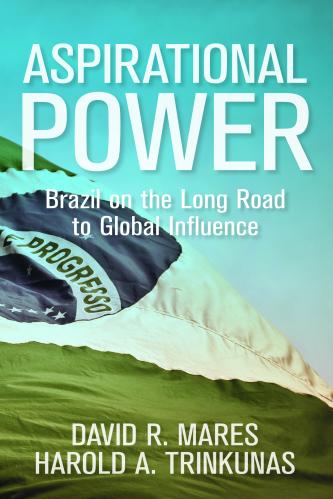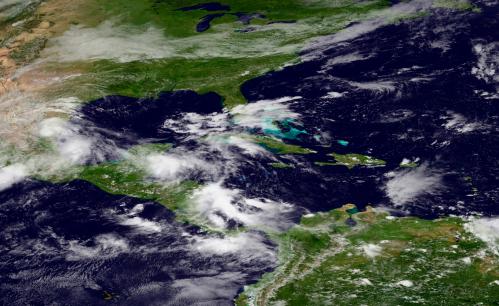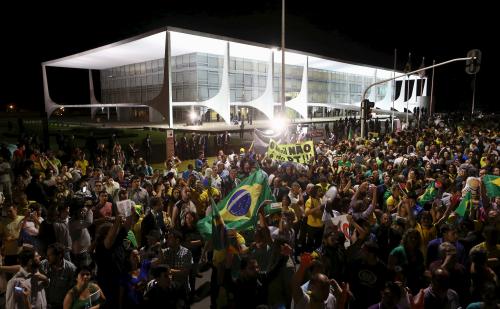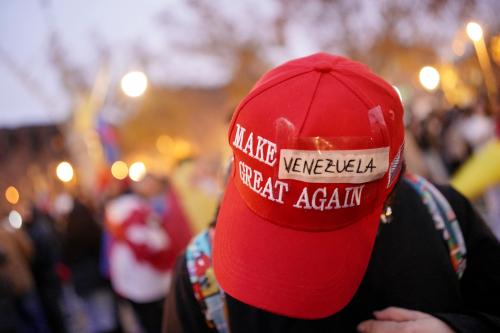On September 29, the Brookings Institution and International IDEA co-hosted a full-day workshop convening high-level experts from Latin American embassies, the U.S. government, academia, and civil society to discuss current trends in Latin American democracy. The moderators of each session have authored blog pieces highlighting the main points of consensus, as well as ongoing challenges, related to their session theme. Read Ted Piccone’s blog post here, and Daniel Zovatto’s here.
Latin America is facing a dramatic electoral supercycle between 2017 and 2019, with 14 of 18 countries holding presidential elections. This comes at a time when democracy across the region is under strain: the return of populism and political polarization, a region-wide network of corrupt politics revealed by the Odebrecht scandal in Brazil, the attempts by particular leaders to perpetuate themselves in power extra-constitutionally, and a generalized disenchantment with the quality of democratic institutions.
Undoubtedly, each unhappy Latin American democracy is unhappy in its own way. But this cycle of elections in the region is taking place against the backdrop of an international order that has turned decidedly less friendly to democracy in general, and in ways that are worrisome for Latin America in particular. These include the abdication of U.S. leadership in the world, the rise of China, and radical shifts in the global information ecosystem that make it easier than ever for state and non-state actors to manufacture propaganda at scale and target voters to deliberately manipulate elections.
U.S. disinterest in democracy abroad
The Trump administration has made it clear at this point that it sees little need to continue the post-Cold War bipartisan U.S. tradition of leadership on democracy around the world. The president himself has befriended authoritarian leaders such as China’s Xi Jinping, and heaped praise on populists such as Rodrigo Duterte in the Philippines, even as the latter encourages extra-judicial killings of drug users. His aspersions against democratic Mexico and hard line against immigrants have been coldly received in Latin America. Even when the Trump administration claims to support democracy, as in authoritarian Venezuela, it has sent mixed signals. Although Nicki Haley has led the diplomatic charge against Venezuela at the United Nations, the president has threatened military action, which unsurprisingly the rest of the hemisphere roundly rejected.
It is true that U.S. support for democracy has been inconsistent across time, but since the end of the Cold War, the United States and Latin America had increasingly partnered to support democracy, including agreeing to take collective action to defend it in the form of the Inter-American Democratic Charter in 2001. Today, it is hard to imagine that any Latin American leader is deterred by the thought of U.S.-led regional sanctions or other costs, should they decide to perpetuate themselves in power extra-constitutionally.
The Chinese investment factor
The Trump administration’s abdication of global leadership has laid bare China’s important impact on the future direction of the international order. Far-reaching Chinese policy initiatives such as the Belt and Road Initiative and the Asian Infrastructure Development Bank confirm that China plans to deploy its well-developed capability to finance and build infrastructure on a global scale to contribute to its international influence.
This is not necessarily bad for Latin America’s democracies. Where there is rule of law and social and political accountability, Chinese-funded projects can be put to good use. But China is indifferent to local political conditions when making investment decisions. This means that in countries whose leaders have authoritarian tendencies, such as Bolivia or Venezuela, China’s investments and loans tend to reinforce the power of the president and facilitate his attempt to perpetuate himself in power. Moreover, China’s indifference further reinforces the sense among authoritarian-leaning leaders that being anti-democratic has few costs internationally, as the United States no longer cares and China never did.
Weaponized information
The decline in the prominence of democracy on the global agenda should be a cause for concern, but it is doubly so when it is now apparent that the tools associated with the global information revolution can be weaponized and turned against democracy itself. The recent U.S. election, the U.K.’s Brexit vote, and efforts to influence French and German elections show that social media and the larger information ecosystem can be used by states such as Russia to shift public opinion deliberately and instrumentally, potentially affecting electoral outcomes.
We know from cognitive psychology that people tend to believe information, however improbable, that is in agreement with their pre-existing beliefs, a phenomenon known as confirmation bias. In addition, they tend to believe information that they see repeatedly and from multiple sources. Social media, which aggregates people into self-selected groups of like-minded users for the purpose of making money off of them through targeted marketing, is tailor-made for propagating disinformation. Countries such as Russia, hostile to the rules-based liberal international order, have deep expertise in conducting disinformation campaigns, and now have access to a radically more effective platform than traditional media.
The revolution in the global information ecosystem has made propaganda cost-effective again.
Essentially, the revolution in the global information ecosystem has made propaganda cost-effective again. Some have argued that Mexico’s coming election is an especially attractive target for Russia. Others have pointed to the role of Venezuela, already expert in deploying fake news via social media domestically, in contributing to a Russian-led information campaign to affect the separatist referendum in Catalonia. The deployment of such capabilities in Latin America’s elections is thus within the realm of the possible. It is cheap, too. The Russian-based Internet Research Agency, which has reportedly played an important role in U.S. disinformation campaigns, is alleged to cost approximately $400,000 per month to run. The traditional belief that the best way to fight bad information is with good information falls by the wayside when producing bad information is both inexpensive and politically rewarding.
Will Latin America stand the test?
Taken together, the rise of China’s global influence, decline of U.S. leadership, and the political weaponization of social media means that Latin America’s elections are taking place under particularly unfavorable international conditions. Elections may potentially become battlegrounds of “fake news,” further undermining the role of informed debate in politics. Moreover, not only do authoritarian-leaning or populist governments now face few external costs for pursuing their preferred policies, the global information revolution offers them new tools with which to manipulate public opinion and election outcomes.
Nevertheless, three recent episodes in Latin America offer hope that democracy will yet prove resilient during the coming electoral supercycle:
- The Grupo de Lima, in which 11 Latin American countries and Canada are supporting democracy in Venezuela, offers evidence that many of the most important states in the hemisphere are willing to work together to defend democracy. Even though progress is thus far slow, we should not discount the efforts of like-minded democracies to significantly influence regional outcomes. For example, as part of the Contadora Group in the 1980s, key Latin American states were able to make a meaningful contribution to peace in Central America in the face of U.S. indifference and occasional hostility to their efforts.
- In the wake of the 2016 Argentine elections, the Macri administration was able to renegotiate the worst features of deals his predecessor had made with China. China continues to be an important partner to Argentina, but on more equitable terms. This highlights the difference that free and fair elections can make, even in the face of China’s rise and the decline of U.S. leadership.
- We can also hope that Latin Americans may be less susceptible to fake news. News media have long been highly partisan across the region. Voters are also familiar with regional attempts to influence public opinion, such as Telesur with its Bolivarian editorial line, which have not been very successful. Many Latin American media consumers may thus be more inured to fake news and more skeptical than their U.S. counterparts about information propagated through social media. This may make it more difficult to conduct deliberate disinformation campaigns.
Each these examples highlights the ways in which Latin Americans can help themselves to support democracy, even in the face of an increasingly unfavorable international environment. And given the direction of global trends, Latin Americans are correct to look first to their own capabilities—individually, nationally, and regionally—rather than depend on rest of the world to protect democracy.
The Brookings Institution is committed to quality, independence, and impact.
We are supported by a diverse array of funders. In line with our values and policies, each Brookings publication represents the sole views of its author(s).









Commentary
How will global geopolitics affect Latin America’s next electoral cycle?
November 27, 2017